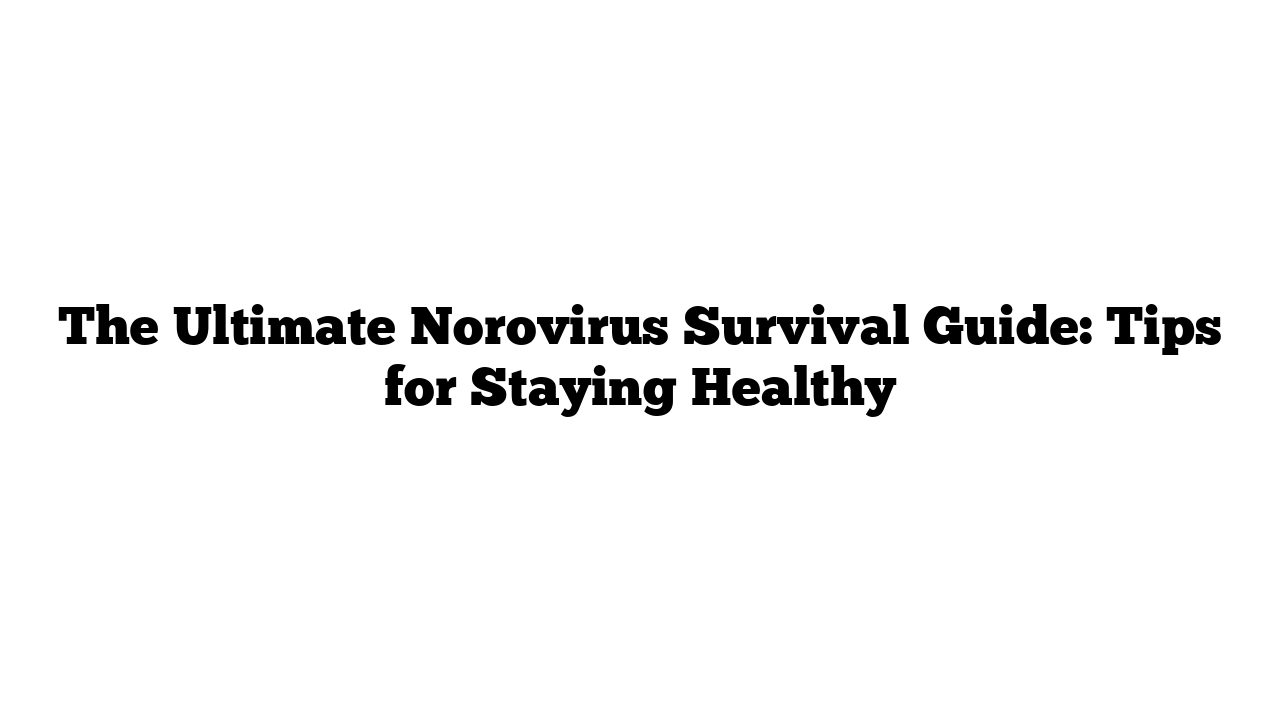Norovirus, often referred to as the “stomach flu,” is a highly contagious virus that causes vomiting, diarrhea, and abdominal pain. With millions affected each year, knowing how to protect yourself and manage the symptoms is essential. In this guide, we’ll cover everything you need to know about preventing, identifying, and recovering from norovirus.
What is Norovirus?
Norovirus is a group of viruses that cause inflammation in the stomach and intestines, leading to gastroenteritis. It spreads easily in places like schools, nursing homes, cruise ships, and restaurants. Even a small amount of the virus can cause an infection.
Symptoms of Norovirus
Symptoms usually appear 12 to 48 hours after exposure and can last 1 to 3 days. They include:
- Nausea and vomiting
- Watery diarrhea
- Abdominal cramps or pain
- Low-grade fever
- Muscle aches and fatigue
While uncomfortable, most cases of norovirus resolve on their own without medical treatment.
How Does Norovirus Spread?
Norovirus spreads through:
- Direct contact with an infected person
- Consuming contaminated food or water
- Touching surfaces contaminated with the virus and then touching your mouth
Did you know? Norovirus can survive on surfaces for days or even weeks, making it critical to maintain good hygiene.
Prevention Tips to Avoid Norovirus
1. Wash Your Hands Often
Handwashing is the most effective way to reduce the spread of norovirus. Use soap and water, scrubbing for at least 20 seconds. Alcohol-based sanitizers are less effective against norovirus.
2. Disinfect Surfaces
Clean high-touch surfaces like countertops, door handles, and light switches with a bleach-based cleaner. Regular cleaning reduces the chances of spreading the virus.
3. Handle Food Safely
- Wash fruits and vegetables thoroughly.
- Cook seafood to at least 145°F to kill the virus.
- Avoid preparing food for others if you are sick or recovering.
4. Stay Home When Sick
If you or your child is experiencing symptoms, stay home to avoid infecting others. The virus is most contagious during the illness and the first few days after recovery.
What To Do If You Get Sick
Stay Hydrated
Dehydration is the biggest concern with norovirus. Drink water, clear broths, or electrolyte solutions. Avoid caffeinated or sugary drinks, as they can worsen dehydration.
Eat Light
Stick to easy-to-digest foods like:
- Bananas
- Rice
- Applesauce
- Toast (BRAT diet)
Rest
Allow your body to recover by getting plenty of sleep and avoiding strenuous activities.
When to See a Doctor
Although most cases of norovirus are mild, seek medical attention if you experience:
- Severe dehydration (dry mouth, dizziness, decreased urination)
- Persistent vomiting
- Bloody stools
- Symptoms lasting more than 3 days
Who is Most at Risk?
Certain groups are more vulnerable to severe symptoms:
- Young children
- Elderly individuals
- Those with weakened immune systems
For these individuals, the virus can lead to complications requiring medical care.
How Norovirus Impacts the USA
In the United States, norovirus is the leading cause of foodborne illness. According to the CDC:
- 19 to 21 million people get sick annually.
- Over 70,000 hospitalizations occur each year.
- It causes about 900 deaths, mainly in vulnerable populations.
Post-Recovery Tips
After recovering, follow these steps to prevent reinfection and protect others:
- Continue washing hands frequently.
- Avoid preparing food for at least 48 hours after symptoms subside.
- Wash all clothes and bedding used during illness in hot water.
Visit Trusted Resources for More Insights
For additional tips and health insights, visit medicaltimes.io. You can also explore:
Top 10 Frequently Asked Questions (FAQs)
1. How long does norovirus last?
Most symptoms resolve within 1 to 3 days, but you may remain contagious for up to 2 weeks.
2. Can you get norovirus more than once?
Yes, immunity to norovirus is temporary, so reinfection is possible.
3. Is there a vaccine for norovirus?
No, there is currently no vaccine for norovirus.
4. Can norovirus be fatal?
While rare, it can be fatal in vulnerable individuals like the elderly or very young children.
5. What foods are commonly linked to norovirus?
Shellfish, fresh produce, and foods prepared by infected handlers are common sources.
6. How is norovirus diagnosed?
Diagnosis is usually based on symptoms, but stool tests can confirm the virus.
7. Can pets get norovirus?
Norovirus is primarily a human virus, but similar viruses can affect animals.
8. What’s the best cleaner for norovirus?
Bleach-based disinfectants are the most effective.
9. How soon after exposure do symptoms appear?
Symptoms typically appear 12 to 48 hours after exposure.
10. Can I go to work with mild symptoms?
No, stay home to prevent spreading the virus to others.
